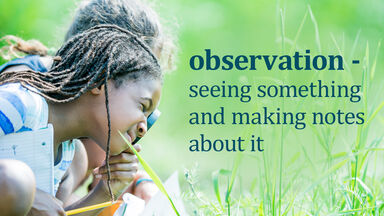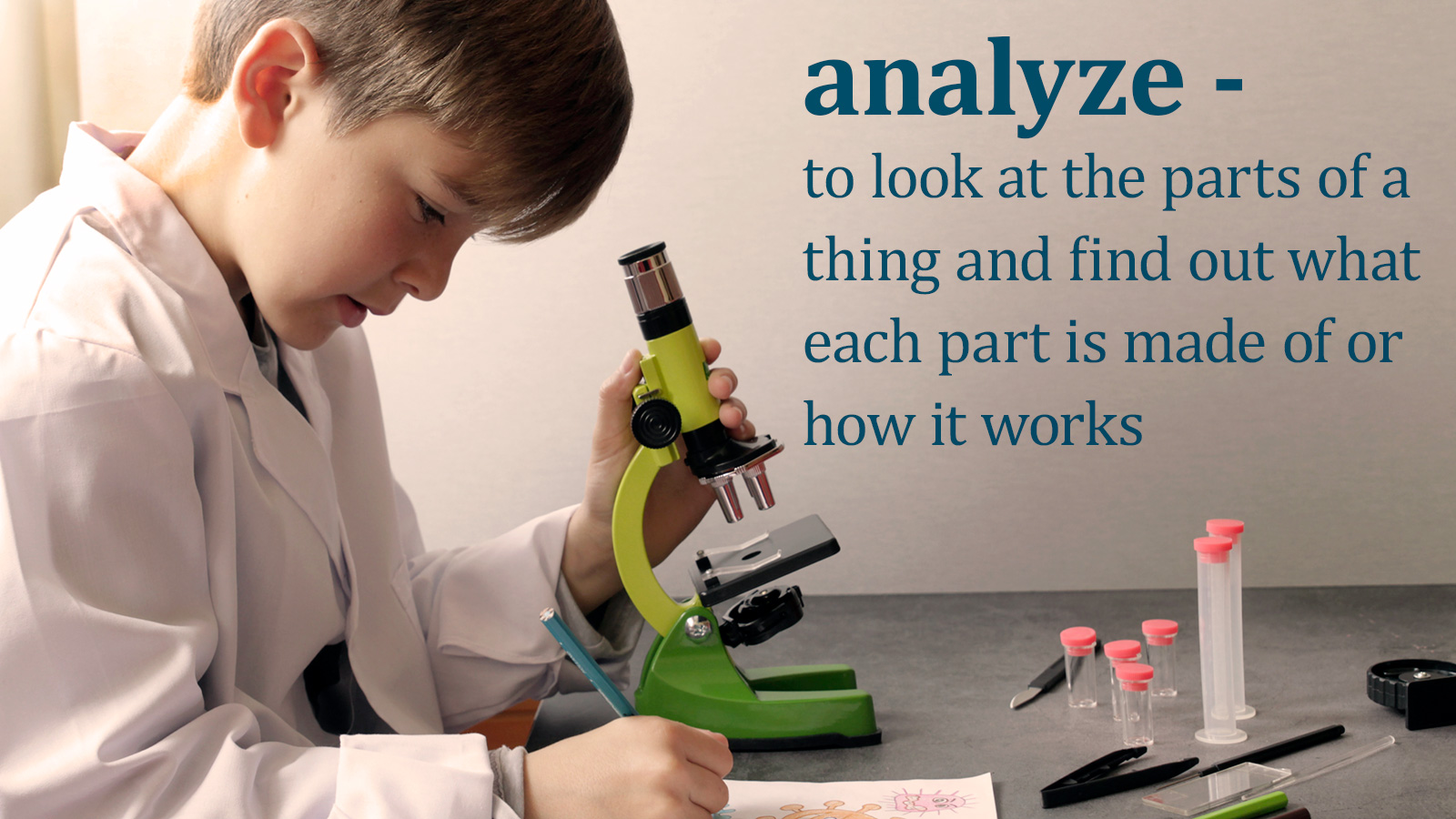Easy Science Definitions for Students With Special Needs
Science Terms Made Simple for Kids
Kids of all ages can explore science concepts using scientific terms. Learn the general science terms you need to know to conduct experiments and investigate how the world works like a real scientist.
 science term definition of observation
science term definition of observation
Basic Scientific Method Vocabulary List
The scientific method is a process kids commonly learn to help encourage experimentation. Whether you use the classic scientific method or a newer variation, these are the words you'll need to know.
- analyze - to look at the parts of a thing and find out what each part is made of or how it works
- data - a bunch of facts or things you know
- dependent variable - a thing you measure that changes when other things affect it
- empirical evidence - what you've learned using your senses
- evidence - a thing or group of things that helps you find an answer
- hypothesis - what you think will happen based on what you know
- independent variable - a thing you measure that isn't changed by other things
- investigation - a careful search for answers
- measure - to find out the size of something
- natural - something made by nature, without being touched by people or machines
- observation - seeing something and making notes about it
- prediction - a guess about what you think will happen
- qualitative - what you know about things without measuring them or using numbers
- quantitative - measurements, or numbers, you know about things
- record - to write down what you know or learned
- scientific question - something you ask that can be tested with science
- variable - thing you are trying to measure in an experiment

General Science Tools Vocabulary List
Scientists of all ages use special tools to help them explore different science questions and solutions. These are the tools you're most likely to use as a kid.
- beaker - a container like a cup that is used for measuring and pouring liquids
- burette - a special glass tube with a knob on one end you can use to open or close the tube
- diagram - a drawing that shows how parts fit together or how something works
- diorama - a mini model that shows how a place looks
- graph - a drawing that shows your data
- laboratory - a special room or building where you do experiments
- microscope - a tool that makes tiny things look bigger
- model - a mini copy of something
- pipette - a small tube that can suck up small amounts of liquids
- theory - an idea or group of ideas that explains something

Terms for Specific Types of Science
Different types of science have different names. Scientists and teachers don't always agree on how to group the different types of sciences, so you might hear that there are two types, three types, or four types of sciences.
The Next Generation Science Standards group all sciences into four types:
- life sciences - learning about things that are alive
- physical sciences - learning about things that are not alive
- Earth/space sciences - learning about the planet Earth or outer space
- engineering/technology sciences - learning about how things are built or how machines work
Branches of Science
The types of science are broken down into smaller groups, called branches. You might hear that there are 5 branches, 7 branches, 10 branches, or even 15 branches of science.
The five main branches of science kids in elementary school learn about are:
- astronomy - learning about things that are not on the planet Earth
- biology - learning about all living things that are like plants and animals
- chemistry - learning about what all things are made of
- Earth science - learning about what the planet Earth is made of
- physics - learning about how things move
Fields of Science
Each branch of science is broken down into fields. Each field of science studies one main thing or idea.
- astrophysics - learning about what things in space are made of and where they come from
- biochemistry - learning about what animals and plants are made of and how they stay alive
- biogeology - learning about the part of Earth where plants and animals live how it works with the rock on the Earth's surface
- climatology - learning about the main types of weather in a certain area
- entomology - learning about insects, or bugs
- geophysics - learning about how weather affects the planet
- herpetology - learning about reptiles and amphibians
- immunology - learning about the part of your body that helps stop sickness
- meteorology - learning about climate and weather
- oceanography - learning about the oceans
- ornithology - learning about birds
- paleontology - learning about things that were alive a long, long time ago
- volcanology - learning about volcanoes
- zoology - learning about animals
Science Made Easy
Science is a big word that means a lot, so it can be hard to understand. Now that you know some of the basic words related to science, you can explore specific types of science. Check out examples of gravity or sound and light vocab words to help you explore even more about science. From there you can explore inventions from the Scientific Revolution. If you need a break from learning, tickle your funny bone with some science puns.
stinsonmilatichated.blogspot.com
Source: https://examples.yourdictionary.com/science-terms-made-simple-for-kids.html
0 Response to "Easy Science Definitions for Students With Special Needs"
Yorum Gönder